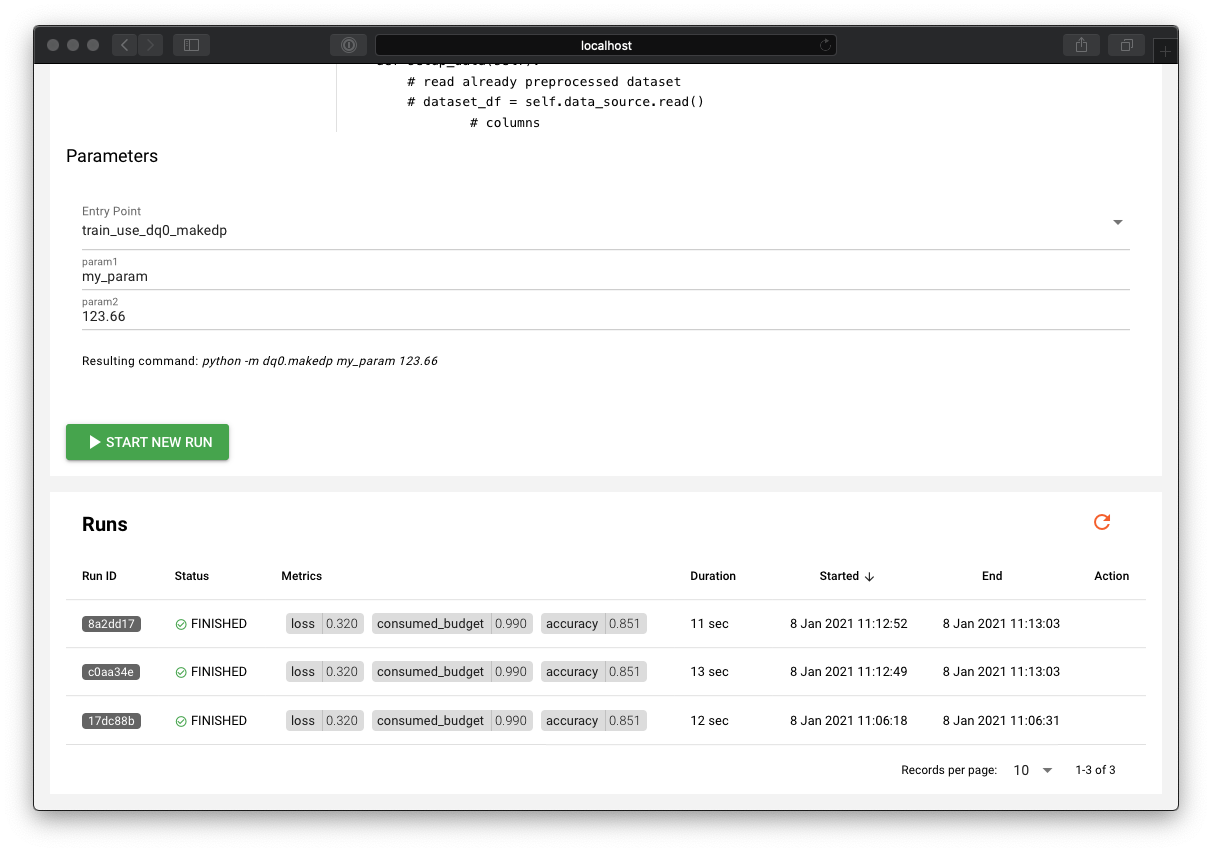About DQ0
Data protection made in Europe
You can attach a wide variety of different data sources.
- CSV, JSON
- HDF5
- Msgpack
- Parquet, Feather, ORC
- SQL
- Binary, Text, Images
- PostgreSQL, MySQL, SQLite
- Oracle, MS SQL
- Apache Drill, Hive
- Snowflake, BigQuery, Redshift
- SAS, SAP Hana
- Trino
For Data Officers
As managed SaaS or on-premise version

For Data Scientists
By Data Scientists for Data Scientists
DQ0 was developed by data scientists for data scientists.
In addition to the core functionality of computing models on protected data, DQ0 offers features for model versioning and tracking of your experiments based on the popular open-source framework mlflow.
You can work with all your favorite frameworks, directly with our free Python SDK.
Additionally, use our built-in web application to keep track of all your projects, experiments and runs and collaborate with your colleagues in research partners with DQ0's complete machine learning and SQL development platform.
You can talk to DQ0 with
- the freely available DQ0 CLI command line program (available for Linux, Mac and Windows) with built-in end-to-end encryption
- the integrated web application
- the DQ0 SDK, directly from your Jupyter development environment
DQ0 SDK
The DQ0 Software Development Kit is a free Python library with which data scientists can work with DQ0 easily and with known tools.
Example of working with the DQ0 SDK:
# import dq0sdk
from dq0sdk.core import Project, Experiment
# create a project with name 'model_1'. Automatically creates the 'model_1' directory and changes to this directory.
project = Project(name='model_1')
# Create experiment for project
experiment = Experiment(project=project, name='experiment_1')
# Train an model
run = experiment.train()
# wait for completion
run.wait_for_completion(verbose=True)
# get training results
print(run.get_results())
# get the latest model
model = project.get_latest_model()
# check DQ0 privacy clearance
if model.predict_allowed:
# call predict
run = model.predict(np.array([1, 2, 3]))
Documentation
More information in the DQ0 Documentation.
Privacy Technologies
Differential Privacy, Encryption and Federated Learning
DQ0 is both technically tested by TÜV Austria and legally rated as a data protection compliant solution. Contact us for more information.
If sensitive data is to be used from other departments or external groups, the methods of anonymization or synthetization are often chosen to protect the sensitive information. Unfortunately, anonymizing or synthesizing the data is not secure. There are numerous studies that have shown that secret information can also be obtained from supposedly completely anonymous data records.
Rocher, L., Hendrickx, J.M. & de Montjoye, Y. Estimating the success of re-identifications in incomplete datasets using generative models. Nat Commun 10, 3069 (2019). https://www.nature.com/articles/s41467-019-10933-3
Machine learning, in particular, poses great challenges to data security, since certain models can be used to track the information obtained about individual data records. DQ0 therefore implements a robust security concept based on the principle of Differential Privacy in order to enable AI modeling for statements about the entirety of the data and at the same time to protect individual data records.
With DQ0, data science analyzes can be carried out to retrieve general information about the data records used, without endangering individual data points. A valuable general statement such as "if the properties a and b are present, the therapy under consideration has a healing probability of p" can be formulated, statements that are prohibited by data protection law such as "due to the presence of properties a and b, patient x must be present in the data set" are not possible.
More information about Differential Privacy:
- Differential Privacy: A Primer for a Non-technical Audience
- The Algorithmic Foundations of Differential Privacy
More information on Federated Learning:
